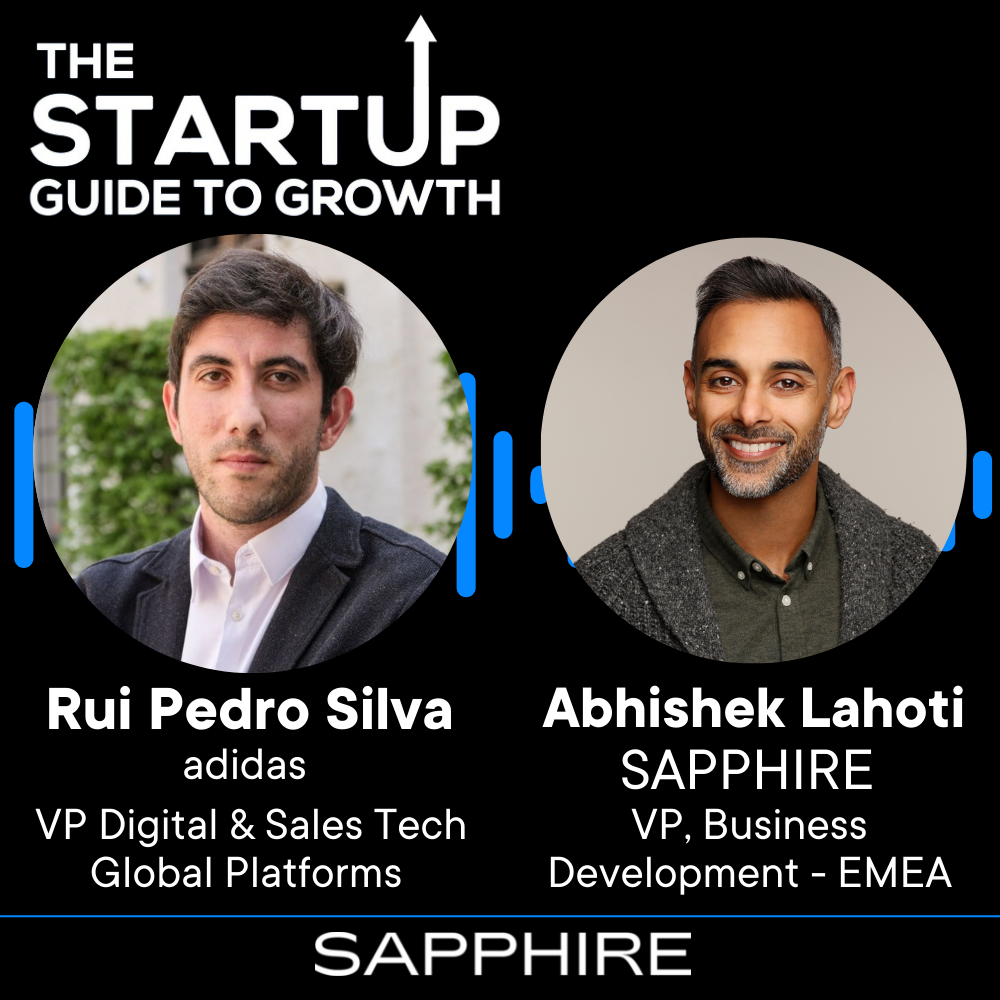Peeking Behind the Curtain of Europe’s Enterprise Transformation

When it comes to rapid change and innovation, enterprises aren’t traditionally considered leaders.
Change management, competing business interests and complicated politics all slow progress and hamstring change. It’s a large reason why only 16% of organizations say digital transformations have successfully improved performance and equipped them to sustain changes in the long term.
But that doesn’t mean enterprises aren’t evolving at all. Behind the scenes, Europe’s enterprises are undergoing wide-scale change in pursuit of technological edges, greater operational efficiencies and a disruption-proof future.
As our Startup Guide to Growth podcast guest, former Chief Digital Information Officer at ERIKS, current VP Digital & Sales Tech Global Platforms at Adidas, Rui Pedro Silva explains, you only have to look at how senior roles in the enterprise have changed to glean how much things are changing. “If you asked me 10 years ago, the CDO role wouldn’t really exist, that it would be a very traditional CIO-type role where you manage your stack, your ERPs, your CRMs and you make sure that everything is running – I don’t think I would have believed you.”
To understand how enterprises are approaching transformation from a macro to a tactical level in 2022, Abhishek Lahoti, Sapphire’s EMEA VP of Business Development sat down with Rui Pedro Silva to talk about enterprise innovation. Here’s what we discovered…
The macro: The future is collaborative
Enterprises rarely act in isolation – there are supply chain participants, third-party vendors and public entities, to name a few. Rui and Abhishek discuss how today’s enterprises must innovate beyond the walls of their own organizations to bring about impactful change. As Rui explains, “For me, it’s all about connecting industries and connecting the different parts of the value chain in the physical world. Where we produce goods and transport goods, things become about physically doing something, and this is still highly disconnected. To serve consumers better, these areas have to be connected to improve the overall service. I call this a kind of an industrial revolution, but it’s really about connecting industries and connecting components of the value chain to elevate the end-to-end service, not only for ERIKS, but for every participant.”
The management: Offsetting speed with scale
Benjamin Franklin said, “never confuse motion with action” – an apt lesson for enterprises in the throes of transformation. As Rui explains, the enterprise is always full of “motion” but that “motion” often comes at the expense of real impact. “The entrepreneurial mindset drives enterprise leadership to do a lot of different things in parallel. Some things are important to do in parallel, but it often means you’re not able to focus on the right things to deliver your strategy.”
Sure, decision-making limits an enterprise’s ability to go fast and enact change, but the processes themselves are also a significant barrier. “One of the biggest issues we have in corporations is we’re blinded by the startup environment,” says Rui. “We believe startups can put things up in a week, which means we have to do the same in a week. But enterprises have more change management, more people to deal with. Putting technology up in a week won’t solve anything if the rest of the organization doesn’t understand it or doesn’t use it correctly.”
While the slow inner workings of European enterprises can’t match the speed of agile startups, Rui suggests enterprises focus not on speed, but on their unique advantage: scale. “Rather than trying something new, often we focus efforts on scaling something that we believe is beneficial for the organization. We don’t have to make something fast, we just need to do this fast enough, but also properly so it can scale.”
The tactical: Goodbye POCs, hello hypothesis-driven initiatives
Running a POC (proof of concept) often feels like a coin flip. Will it work? Do customers want it? Is this a worthwhile investment? The reason for this uncertainty, Rui explains, is “it’s hard to say if a POC is a success or a failure because it doesn’t tell you anything about the software’s viability in the market. A POC only tells you that the software works. So what? Is the quote faster now? Are we confirming that we can operate on £2 end-to-end in a warehouse? Enterprises need to ask ‘what do I get out of it?’ rather than just finding out if the software works. With today’s technology, the software will most likely always work. That’s not the problem anymore.”
To counter the hit-and-miss uncertainty of POCs, Rui suggests enterprises shift their thinking to hypothesis-driven initiative, which means asking “what are the things we want to validate and how do we find the shortest route to validate them without having to make massive technological developments to try it out?”
How ERIKS tests new ideas with hypothesis-driven development
To illustrate how to execute hypothesis-driven development, Rui shared a recent project his team worked on.
“At ERIKS, we wanted to test this multi-user fulfillment network, which is a little bit like a fulfillment by Amazon, but for a non-Amazon marketplace, to understand if there was a way for our customers to understand that product. Would they really buy it? So we created a non-software MVP.”
“Then we found a small partner that could test it in India, Pakistan, southern Asia and in a few areas of Europe. Getting a partner that already had a system meant we could move orders through it and develop a sales proposition and see if the customers would want to talk to us.”
“So instead of just building a POC, we could also validate the pricing, validate if the proposition was correct and validate if the customers were understanding it. And because we defined the hypothesis we wanted to validate, we could confirm and discard the ones that were relevant for us to then define our acquisition path and understand what kinds of companies, or what kinds of capabilities, we want to build to offer to the market.”
Dive deeper into European enterprise innovation
This is just part of a wider conversation about how European enterprises are transforming themselves in 2022. Listen to Rui and Abhishek’s full conversation on the Startup Guide to Growth podcast.
Disclaimer: Nothing presented within this podcast is intended to constitute investment advice, and under no circumstances should any information provided herein be used or considered as an offer to sell or a solicitation of an offer to buy an interest in any investment fund managed by Sapphire Ventures (“Sapphire”). Information provided reflects Sapphires’ views as of a time, whereby such views are subject to change at any point and Sapphire shall not be obligated to provide notice of any change. Views presented may reflect the authors’ opinion and/or interpretation and Sapphire provides no assurance to the accuracy of such views. Various content and views contained within this podcast represent those of third party guests, which do not necessarily reflect the views of Sapphire. Such views are subject to change at any point and do not in any way represent official statements by Sapphire. Various statements made by third party guests about Sapphire relate to the nature and type of management services provided by Sapphire and do not constitute testimonials to Sapphires’ investment advisory services and no inference to the contrary should be made. Companies mentioned in this podcast may be representative of a sample of portfolio companies in which Sapphire has invested in which the author believes such companies fit the objective criteria stated in commentary, which do not reflect all investments made by Sapphire. A complete alphabetical list of Sapphire’s investments made by its direct growth and sports investing strategies is available here. No assumptions should be made that investments listed above were or will be profitable. Due to various risks and uncertainties, actual events, results or the actual experience may differ materially from those reflected or contemplated in these statements. Nothing contained in this podcast may be relied upon as a guarantee or assurance as to the future success of any particular company. Past performance is not indicative of future results.
